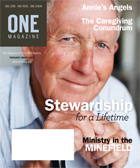
February-
March 2013
Stewardship for
a Lifetime
------------------
|

Saying "I Do" Again
by Bill and Brenda Evans
Bill Bentley came home from work, avoided neighbors, closed shades, found the darkest room, and picked at saltines and a can of soup. He turned on the television or radio to hear a voice, but kept away from “real” people. And he did not sleep. At last, he called it what it was: loneliness. “This is not good,” he said. “I need another lady in my life.”
The Journey Begins…Again
So Bill began to think about women he knew. “Those without baggage and without a living husband. Not many like that,” he said. But he remembered Amelia, a woman he and his wife had known and liked, and went to church with at one time. Like Bill, she was single now. So he asked a friend for her phone number.
“Will you go to breakfast with me?” he asked. “Yes,” she said. Bill had decided ahead of time that if she said no, it would be like Gideon’s fleece, because he had prayed that way. A no would be a no from the Lord, but it was not a no and he was glad.
But he got anxious and called back. “How about we not wait for that breakfast thing? How about we go out for dinner tonight?”
“Sure, why not?” she said, and they did.
Both Bill and Amelia Bentley have experienced the pain of losing a spouse. They know its loneliness, its solitary confinement. They know what existence without attachment is. They remember loss, amputation, finality. Being thrown to the wind like so much flotsam. Chaos, anger, anxiety, fear.

The Bentleys also know the pleasure of saying “I Do” again. After widowhood, remarriage is good because they have avoided the potholes. Some couples rush full speed ahead and fall in all the way to China. Most experts on remarriage say Christians better pay attention before they hurry to the altar for the second time. The Bentleys agree. The thing that should be a pleasure might not be.
Avoiding the Potholes
Bill and Amelia know there can be trouble spots. They recommend that before remarriage couples resolve tensions or disagreements in at least three main areas: values, children, money.
Divided minds fracture; united minds fuse. And so substantial differences or disputes about beliefs or values raise strong pothole warnings. William and Amelia started with God, with William’s yes-no fleece and Amelia’s assurance, as she says, “that the Lord was dealing with us both about marrying. Even my son-in-law saw it.”
Attitudes about God, for example, may differ. “Some people want a God who stays in their wall locker,” Bill says. “But we let Him out. We count on Him showing up in our lives on a regular basis. He did before we were married. He still does.”
What about other differences? One of Bill’s core values is taking care of Amelia. Before their marriage, he made a promise: “My first wife Willa taught me how a lady should be treated. And now God has brought the two of us together, and you are the love of my life. I promise that I will never put you down. If I can’t build you up, I will keep my mouth shut.”
He also prepared meals for the first several weeks of their marriage. “It was like he was on duty, determined to take care of me,” she says. Bill and Amelia had agreed to settle in his home, and so she was on duty, too, in a different way. “I waited and walked softly,” Amelia says, especially about making changes in the house, even those changes they had already talked about and agreed upon. During those first months, they found their way by practicing deference and respect for each other, and it worked. In the kitchen they now putter and prepare meals together.
Children are a second crucial issue to consider in remarriage. Young couples who plan to blend “my child, your child, and eventually our child” must share core faith values, communication skills, and discipline strategies to avoid deep potholes. For older couples like Bill and Amelia who are in their early 70s, strained relationships with adult children are a potential pothole.
Children of older couples may hold anger or dislike, even try to interfere with the marriage. A son may think his widowed father is being disloyal to him or to the memory of his deceased mother. Some may feel abandoned or jealous, or dislike the personality, habits, or religion of the new spouse. Others acquiesce but simmer. Many continually mistrust motives or fear losing an inheritance.
Merging families can be difficult. Before remarriage, couples should begin to build relationships between children and the soon-to-be new mate. Bill was up-front. “I told Amelia’s daughters that I wanted to be a friend to them, but not their daddy. I said, ‘You already have a daddy.’ They wait on me and hug me, but they know I’m not trying to replace the daddy they lost.”
Kindness and acceptance are the best goals. Bill and Amelia feel blessed that their 22 family members seem to agree. “They talk and are friendly and there is no animosity, but their lives don’t mingle, and that’s okay,” Amelia says. Bill and Amelia hold family birthday parties, and early on the children joined forces to roast their parents at East Harbor on Lake Erie with the daughters supplying the jokes and pokes. But Bill and Amelia don’t push their children to become best friends.
Money trouble is a third pothole to avoid in remarriage. For young couples, the dialogue usually focuses on budgets, credit cards, childcare, vacations, jobs, and getting by. For older couples who marry for the second time, money issues may be more complex: which monies to mingle or not, how to handle inheritances, when to pass along items to the children. Mistrust of the new spouse and even of the child’s own parent is often high.
Bill and Amelia took several steps to avoid problems. “The first principle is that God owns it all, and He expects us to plan with that in mind. But, you know, horns grow on heads real quick when it comes to two sides and money. So we sat down and settled things,” Bill says. After his first wife’s death, he gave their children her personal items, re-did his will, and made his children beneficiaries of her IRA annuity after his own death.
When he and Amelia married, they merged some assets, kept others separate, and named beneficiaries on all accounts. They also made a Life Estate Agreement that gives Amelia the right to stay in the house as long as she lives. Each has personal savings with named beneficiaries as well. In addition, Bill has a Charitable Gift Annuity with the Free Will Baptist Foundation to benefit Free Will Baptist ministries and give him income now. Amelia also has a Revocable Trust there. “The Foundation is the best there is for this sort of thing,” Bill says.
How much do adult children need to know about their parents’ money? Enough…whatever that is; but not too much…whatever that is. That’s the best advice the experts offer. You and your mate must decide, but don’t act like it isn’t a problem, because it is. One caution: big surprises, especially negative ones, often stir up big problems, especially in remarriages.
Bill and Amelia don’t plan on big surprises because they have figured out how to make remarriage a really good time. “As Christians, you eventually reach a point where you know how to live sensibly, “ Bill says. And from what we see in their marriage and in their families, they’ve also learned how to love sensibly the second time around.
About the Writers: Bill Evans, former director of the Free Will Baptist Foundation, lives in Catlettsburg, Kentucky, with his wife Brenda, a retired English teacher. Visit www.fwbgifts.org for more information on planned giving that benefits your favorite ministry.
|
|

